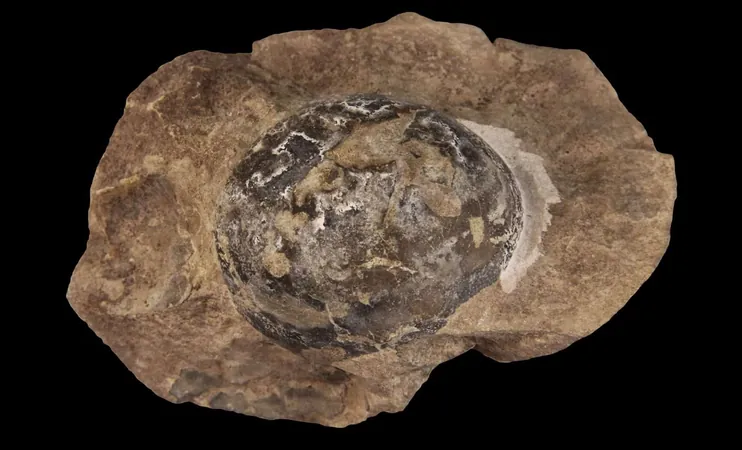
Ancient Egg Discovery Blows Open New Insights Into Prehistoric Marine Life!
2025-05-26
Author: Ming
Stunning Fossil Egg Found in Antarctica Shakes Up Prehistoric Understandings
Scientists are reeling from an extraordinary discovery in Antarctica: a massive soft-shelled egg fossil, estimated to be around 68 million years old and comparable in size to a football. Named Antarcticoolithus bradyi, this remarkable find is not only the largest soft-shelled egg ever recorded but also the second-largest egg of any species known to man! This revelation is prompting major shifts in how we view the reproductive habits of ancient marine reptiles, including the infamous mosasaurs and plesiosaurs.
An Egg Like No Other
Unearthed in 2011 by a Chilean expedition, this fossil baffled scientists for years. Unlike the well-known hard-shelled dinosaurs' eggs, A. bradyi features a soft, thin shell reminiscent of today's snakes and lizards. Measuring approximately 11 inches long and 8 inches wide, its deflated and wrinkly exterior led to its quirky nickname, 'The Thing'—a nod to the classic Antarctic horror film. Julia Clarke, a vertebrate paleontologist from the University of Texas at Austin, spearheaded the research team that unraveled its secrets. "There’s no known egg like this," Clarke noted, emphasizing its significant size and unique structure.
Hints of Mosasaur Lineage
This fascinating egg was discovered alongside the skeleton of a colossal mosasaur, Kaikaifilu hervei, which measured over 23 feet long. These prehistoric creatures dominated the oceans during the late Cretaceous period, and the proximity of juvenile mosasaur and plesiosaur bones suggests that the area may have served as a nursery for these marine reptiles. Lucas Legendre, the lead researcher at UT Austin, stated, "It is from an animal the size of a large dinosaur, but it is completely unlike a dinosaur egg." Their comparative analysis of 259 modern reptiles indicates that this egg likely came from a mosasaur, shedding new light on the reproductive strategies of these ancient beings.
Rewriting The Reproductive Rulebook
This remarkable discovery is challenging long-held theories about dinosaur reproduction. Soft-shelled eggs like A. bradyi are rarely found in the fossil record, leading to the assumption that the ancestral egg of dinosaurs was hard-shelled. However, recent finds suggest that soft-shelled eggs may have been more prevalent among ancient reptiles than previously understood. Renowned paleontologist Mark Norell remarked, "These findings prove otherwise," emphasizing how multiple independencies in egg shell evolution may have transpired across dinosaur lineages.
A New Dawn for Evolutionary Understanding
Beyond taxonomy, the implications of these revelations are vast, reshaping our understanding of evolution itself. For years, scientists have used modern birds and crocodiles to explain dinosaur biology, but this new fossil evidence is painting a far more intricate and diverse ecosystem. Matteo Fabbri, a Yale researcher and coauthor of the study, commented, "From an evolutionary perspective, this makes much more sense than previous hypotheses." This underscores how crucial it is to look beyond contemporary analogs when piecing together the story of ancient life.
Antarctica: A Gateway to Prehistoric Wonders
As we continue to unearth the secrets of our planet's history, Antarctica remains a treasure trove of revolutionary findings that are reshaping our understanding of prehistoric life. Stay tuned as we delve deeper into the mysteries of our ancient past!



 Brasil (PT)
Brasil (PT)
 Canada (EN)
Canada (EN)
 Chile (ES)
Chile (ES)
 Česko (CS)
Česko (CS)
 대한민국 (KO)
대한민국 (KO)
 España (ES)
España (ES)
 France (FR)
France (FR)
 Hong Kong (EN)
Hong Kong (EN)
 Italia (IT)
Italia (IT)
 日本 (JA)
日本 (JA)
 Magyarország (HU)
Magyarország (HU)
 Norge (NO)
Norge (NO)
 Polska (PL)
Polska (PL)
 Schweiz (DE)
Schweiz (DE)
 Singapore (EN)
Singapore (EN)
 Sverige (SV)
Sverige (SV)
 Suomi (FI)
Suomi (FI)
 Türkiye (TR)
Türkiye (TR)
 الإمارات العربية المتحدة (AR)
الإمارات العربية المتحدة (AR)